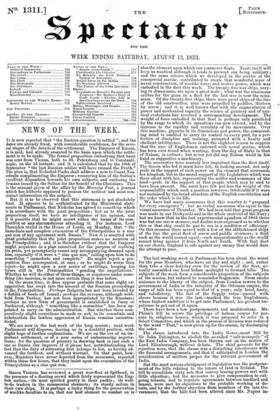Queen Victoria has reviewed a great war-fleet at Spithead, in
the presence of a floating crowd which fairly represented the Eng- lish nation,—its most spirited gentry in their yachts ; its well- to-do traders in the commercial steamers; its sturdy sailors in their own ships. It is perhaps a lucky thing for the preservation of warlike faculties to us, that our best element to combat on is also.tho element upon which our commerce floats. Trade itself will keep us nautical although it tends to prevent our being military; and the same science which we developed in the service of the commercial marine, contributed to create that wonderful mass of naval construction, of warlike force, and motive power, which was embodied in the fleet this week. The twenty-five war-ships, vary- ing in dimensions, are upon a great scale ; what was the maximum calibre for the guns in a fleet for the last war is now the mini- mum. Of the twenty-five ships, three were great ships-of-the-line of the old construction, nine were propelled by paddles, thirteen by screw ; and it is well known that with the augmentation of power and mechanical capacity the science of gunnery and of nau- tical evolutions has received a corresponding development. The weight of force embodied in that fleet is perhaps only paralleled by the range to which its operations can now extend, and by the increase to the rapidity and certainty of its movements. Over this machine, gigantic in its dimensions and power, the command- ing mind is enabled to carry its control to every part, by a per- fection of discipline and training, animated with a hearty and obedient intelligence. There is not the slightest reason to suppose that the race of Englishmen endowed with naval genius, which has been ever found when wanting, from the day of Blake to that of Nelson, is extinct; but never yet did any Nelson wield in his hand so suggestive a machinery.
The accessories were scarcely less important than the fleet itself. The Queen who led it must have felt, in looking around, not only pride in the support of such power on the element that surrounds her kingdom, but in the moral support of the Legislature which was there afloat with her, representing the nobles and commons of the land—pride in the support of that people which may be said to have been present. She must have felt not less the weight of the responsibility which such a position involves; intolerable if it were not sustained by the broad structure of the English constitution and the order which is its life.
We have had many assurances that this country is "prepared for every emergency "; but no verbal assurance was equal to the visual assurance of Thursday. We had been told that great progress was made in our Dockyards and in the whole materiel of the Navy; but we knew that in the last experimental squadron of 1845 there was but one screw steamer, and doubts were expressed as to whether this or that ship could be put to sea in a eondition of efficiency. On this occasion there moved with a few of the oldfashioned ships of the line the great fleet of screw and paddle steamers ; a fleet such as the world cannot equal—such unquestionably as the world cannot bring against it from North and South. With that fleet on our shores, England is safe against any enemy that would dare the attempt to pass.


























